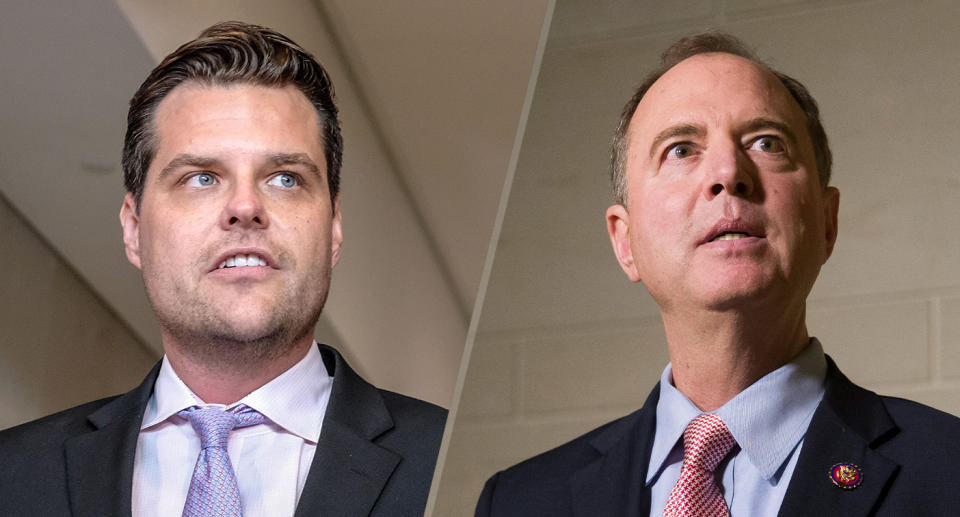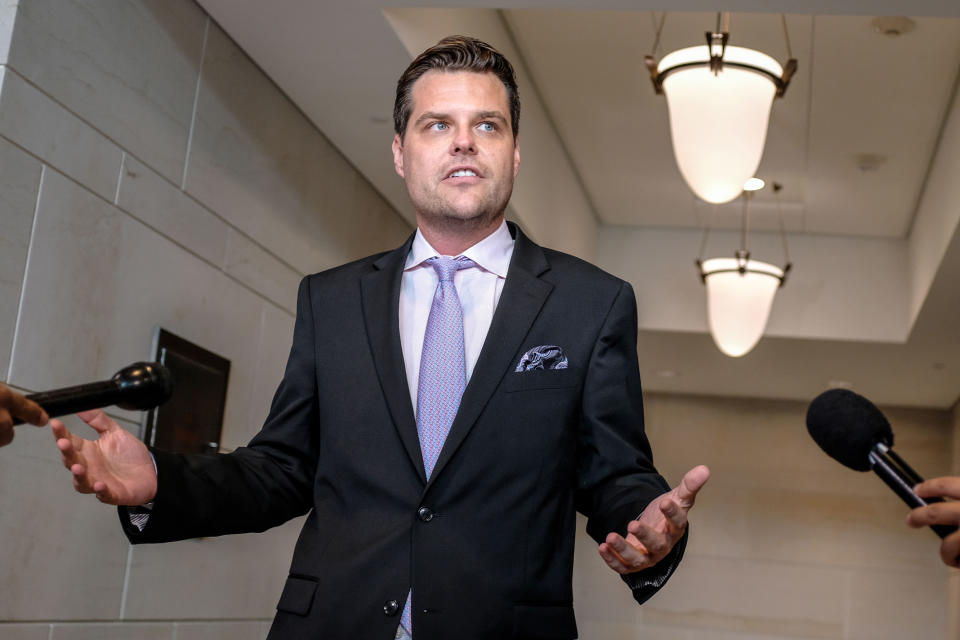'Gaetz-crasher': Here's why a Republican lawmaker was barred from closed-door testimony
When Republican congressman Matt Gaetz tried to attend an impeachment inquiry deposition Monday morning at the U.S. Capitol, he ran smack into the often arcane and confusing rules of Congress.
Gaetz, a rabble-rouser from Florida who accused Democrats of dirty tricks last fall, claimed that as a member of the House Judiciary Committee he should be allowed to attend the deposition of Fiona Hill, President Trump’s former top Russia and Europe adviser.
The impeachment inquiry depositions are being held behind closed doors inside the Capitol. The House Intelligence Committee, chaired by California Democrat Adam Schiff, is running the meetings, but the investigation also includes the House Oversight and Government Reform Committee, as well as the House Foreign Affairs Committee.
The depositions are run by committee staff. Members of Congress from these three committees are invited to attend and observe, but only staff are asking the questions.

When he showed up on Monday, Gaetz was told that because he was not a member of one of those three committees, he could not attend. A parliamentarian who interprets congressional rules was consulted and concurred that Gaetz could not attend.
Gaetz later complained on Twitter about the movement of the impeachment inquiry out of the Judiciary Committee, chaired by New York Democrat Jerry Nadler.
“Judiciary Chairman [Nadler] claimed to have begun the impeachment inquiry weeks ago,” he wrote. “Now, his own Judiciary members aren’t even allowed to participate in it.”
Nadler’s Judiciary Committee was indeed the hub of hearings aimed at Trump, especially as special counsel Robert Mueller conducted his investigation into whether the Trump campaign colluded with Russia to interfere in the 2016 presidential election, and then later obstructed justice.
But as Congress returned to Washington in September after the August recess, the center of gravity was already shifting away from Nadler and toward the three other committees. Yahoo News reported this “shift to Schiff” on Sept. 24.
On Sept. 9, the Oversight and Foreign Affairs Committees together sent letters to White House counsel Pat Cipollone and to Secretary of State Mike Pompeo about their concerns that Trump and his personal lawyer Rudy Giuliani had “acted outside legitimate law enforcement and diplomatic channels to coerce the Ukrainian government into pursuing two politically motivated investigations under the guise of anticorruption activity.”

The letters asked the White House and State Department to provide all documentation and correspondence related to this issue.
This was over a week before news first broke that a whistleblower inside the intelligence community had filed an official complaint on Aug. 12 with the Office of Inspector General of the Intelligence Community about Trump’s July 25 call with Ukrainian President Volodymyr Zelensky. But the whistleblower also spoke with staff at Schiff’s Intelligence Committee before filing his complaint, so it’s possible that staff at Oversight and Foreign Affairs sent their Sept. 9 letters with that information in mind.
The letters came from Oversight and Foreign Affairs because Oversight has jurisdiction for the executive branch and Foreign Affairs has jurisdiction over the State Department. The intelligence community has jurisdiction over itself, and since the whistleblower is a member of the intelligence community, it was a straightforward process for House Speaker Nancy Pelosi to make Schiff the new point person.
“Committees are engaged based on their jurisdiction and prior investigations into related issues,” said a House Democratic leadership aide.
After the White House and State Department ignored a second set of letters on Sept. 24, the congressional committees issued subpoenas on Oct. 4, which carry significant legal weight. If Trump does not comply with a congressional subpoena, Congress could vote on an article of impeachment for obstruction of Congress.
In addition, Nadler’s Sept. 17 Judiciary Committee hearing with Corey Lewandowski, a former Trump campaign official and adviser, was widely viewed among Democrats as a disaster and an embarrassment.
Pelosi’s dissatisfaction with Nadler’s performance, combined with the natural jurisdiction of the other three committees over separate elements of the Ukraine matter, was the justification for shifting the impeachment inquiry into its current setting.
Gaetz wasn’t allowed to attend Monday morning’s testimony simply because he’s not on a committee with jurisdiction over the subject of the deposition. And House rules give committee chairmen wide latitude over how to run hearings and depositions.
Read more from Yahoo News:
Greta Thunberg: Powerful men 'want to silence' young climate activists
Driven from Central America by gangs and finding refuge in Kentucky: One woman's story
'I talk about power because you're not supposed to': Why Stacey Abrams still wants to be president
Nation's intelligence officers are resigned to serving a president who doesn't trust them
Before Black Lives Matter: Exhibition pays tribute to an earlier NYPD killing of unarmed black man
360: U.S. pulls support for Syrian Kurds: What happens next?
PHOTOS: Turkey presses Syrian assault as thousands flee the fighting



